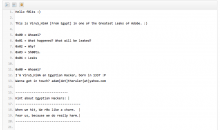'Anonymous' takes down Texan RFID-tracking school
Activist group Anonymous, or persons using its insignia and name, claim to have taken down the website of the US schools that have made it compulsory for students to wear RFID tags.
Andrea Hernandez, a sophomore student at the John Jay High School's Science and Engineering Academy in San Antonio, last week refused to wear the tags, arguing her rights to privacy and freedom of expression, along with her religious beliefs, meant she did not want to wear the tracking devices.













































































